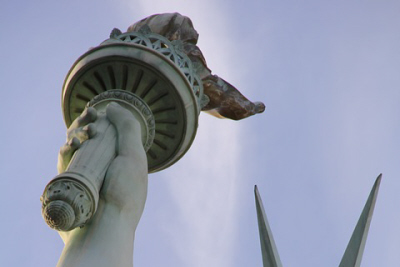
The Three ‘P’s of American Exceptionalism
One day, I decided to answer the question: “What makes America different?” Do we have any distinctive viewpoints or characteristics that we can offer to the world? In other words, what makes America more than a place on the map? After examining the question, I summed up the answer in three words: America is pioneer; America is pious; and America is paradigmatic.
Pioneer
In contrast to the nations of Europe, America has for most of her history been marked by a vast hinterland of unexplored, or at least unsettled, wilderness. This may only seem like a casual observation, but it has significant effects. America’s wilderness forged a distinctive mark on the American personality – first by enticing adventurous souls from around the world, and then by rewarding their toilsome work.
As a result, there is something slightly uncivilized, we might say, about Americans. We still value, far more than other countries, the rugged individualism and enterprising spirit that originally settled the west. Even as the broad open spaces have been steadily supplanted by civilization, Americans retain a sense of having to ‘make it’ on their own. When we look at trends like gun ownership or support for limited government, it is easy to understand: our nation consists of people who (whether directly or through their ancestors) were willing to venture into the wilderness on their own.
Pious
When I say that America is ‘pious,’ many will object. As the fountainhead of so much secularism, America may not seem like a pious country. Yet the numbers still back it up: America is vastly more religious than Europe. In fact, this country has always had a distinctive for religion, whether by attracting crowds of persecuted believers, or fighting against the ‘godless’ philosophy of Communism. But don’t take my word for it. In 1835, de Tocqueville noted that in America, more than in any country in Europe, there was a religious tenor that ran strong:
“America is still the place where the Christian religion has kept the greatest real power over men’s souls; and nothing better demonstrates how useful and natural it is to man, since the country where it now has widest sway is both the most enlightened and the freest.”
In 1955, President Eisenhower admitted that religion has always been, and continued to be, an American distinctive:
“Without God, there could be no American form of Government, nor an American way of life. Recognition of the Supreme Being is the first — the most basic — expression of Americanism. Thus the Founding Fathers saw it, and thus, with God’s help, it will continue to be.”
Paradigmatic
We don’t use the word ‘paradigm’ much these days, but it refers to a pattern or example. The original founders of America aimed to create more than a country: they wanted to create an ideal for other nations to follow. John Winthrop, Massachusetts Bay Colony governor, knew from the beginning that this was true. He said,
“For we must consider that we shall be as a City upon a hill. The eyes of all people are upon us.”
As the Founding Fathers recorded the ‘self-evident truth’ that ‘all men are created equal,’ they knew that they were founding a nation that would be more than a country. They were starting an experiment in democratic republicanism.
Even today, the idea of America as an example is still widespread. We view our liberties and freedoms as examples for the rest of the world. We set policies and make decisions that we expect the rest of the world to follow.
Conclusion
Admittedly, these trends do not look the same today as they once did: the religious landscape is changing, the vast wilderness is mostly tamed. Yet the original ideas are still vibrant in America and must be carried on.



